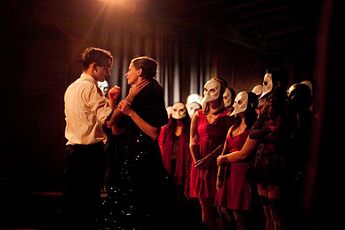That’s the realization I was having upthread. The term “fourth wall” comes from stage plays or live sitcoms where it’s assumed the characters are in a standard room, but one of the walls doesn’t exist because that’s where the audience and cameras are. In a movie, the sets may be fully realized, but the “fourth wall” is the camera lens, which is usually not addressed by the characters.
From a psychological standpoint “fourth wall” means that in most entertainment the audience watches through this “missing” but accepted imaginary wall safe in the assumption the actors will not “break through” the fourth wall - they cannot see nor interact with the audience within the fiction of their story. If you are watching a movie or a tv show (or a stage play in general) one does not usually expect a character to begin talking to you the viewer, who is normally an unseen observer.
When this does happen - on stage with a narrator who addresses the audience, or in certain movies like Ferris Bueller’s Day Off where the character does look straight into the camera and talk to the audience, this is commonly called “breaking the fourth wall”. This is accepted in theater since it is a live performance and is common, but in a movie or a TV show when done unexpectedly this can make the audience feel uncomfortable - “They can see me?” It’s rare in movies for an actor to look directly into the camera lens, though it has been done for effect without breaking the fourth wall in movies like Silence of the Lambs where characters routinely stare directly into the camera lens while speaking to one of the characters in the story as if the camera (and the audience) is the character for a very intrusive and uncanny effect.
As I’ve been realizing IF routinely breaks the fourth wall since the player does participate, and that sort of goes against any concept of a wall separating the observer and the character. Stage plays often break the fourth wall to solicit audience participation or interaction, and interaction is key in IF.
@Zed pointed out that the more unusual state for IF is when it actually calls attention to itself as a piece of fiction - and while that is definitely a fourth wall break, I venture that is actually an ingredient in a higher level of convention breaking involving “meta narrative.” In Doki Doki Literature Club Monika breaks the fourth wall initially by reminding the player to save the game (a common VN trope/joke), but then ultimately reveals her status as a meta-narrative character by changing files and deleting other characters in the game… “You knew this was a game, right?” It breaks the fourth wall on the route to becoming meta-narrative. (In my definition I’m forming here.)
Another interesting example from theater that might apply more to IF: In the play Sleep No More there are no seats. The audience wanders an environment where the scenes and story occur simultaneously in multiple locations. The audience all wear identical white masks (neutral but creepy) and are instructed to not touch or speak to the actors - for safety, to not intrude in the narrative, and so as to be distinguishable from the performers…but also to lend them a bit of fourth-wall comfort in their adventure. The bit of anonymity lended by the masks was discovered to allow the audience be a bit bolder in pursuit of the action in the story. In this production, there literally is no fourth wall since the audience is immersed in fully-realized environmental sets, but the mask lets them maintain some sense of separation from the action. Where this show negates the fourth wall, the player-observer barrier is broken occasionally in segments where audience can get pulled into a “one on one” with an actor where they are talked to directly, given props to deliver, or information no one else receives about the plot - almost exactly like in an IF game!
(Emily Short has written about her experience with Punchdrunk, the creators of Sleep No More and the parallels their immersive-theater style has with IF.)
So perhaps what we initially defined as a “fourth wall break” in IF isn’t so much that as it is a “lifting of the mask”. The player is already through the fourth wall, but wear the mask of a player character - even if the protagonist is an Ageless, Faceless , Gender-Neutral, Culturally-Ambiguous Adventure Person. The parser lifts the mask by saying “You (the player) don’t need to open that door” when the character obviously could, or if the game goes full meta-and becomes about you the player playing the game and leaving the confines of an established Player Character (as Monika does in DDLC: (paraphrased) “I’m not talking to “you” that character you thought you were playing, but you the player… I don’t even know if you are a boy or a girl…”


